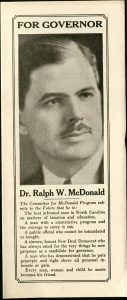
Election day is a mere 27 days away, so the robocalls should be interrupting your evening meals and the postcards and fliers will be filling your mailboxes. We, in the North Carolina Collection, can’t help make your evenings more peaceful. But we can relieve you of some of the clutter. As with elections past, we’re eager to collect campaign flyers, postcards and fundraising letters. Our collection of campaign ephemera now includes more than 5000 items and dates back to the 1800s. And we’re eager to keep it growing. We want to document campaigns across the state and at all levelsᾹlegislative, judicial, Council of State, Congressional and Presidential. That’s hard to do from our spot here in the Triangle. Please help us. Hold on to those mailers, flyers and voter guides. Then when you can stomach the clutter no more, send them our way. The address is:
John Blythe
Assistant Curator
P.O. Box 8890
Wilson Library, CB#3930
Chapel Hill, NC 27515-8890
One final note. We like knowing about the yard signs, particularly ones that strike you as unique. Unfortunately, they take up significant space and it’s hard for us to store them. Before you send us the actual sign, would you mind taking a photo of it and emailing the file to us as an attachment? The address is blythej@email.unc.edu Please remember to tell us where and when you spotted it.
Thanks for helping us document North Carolina politics.
